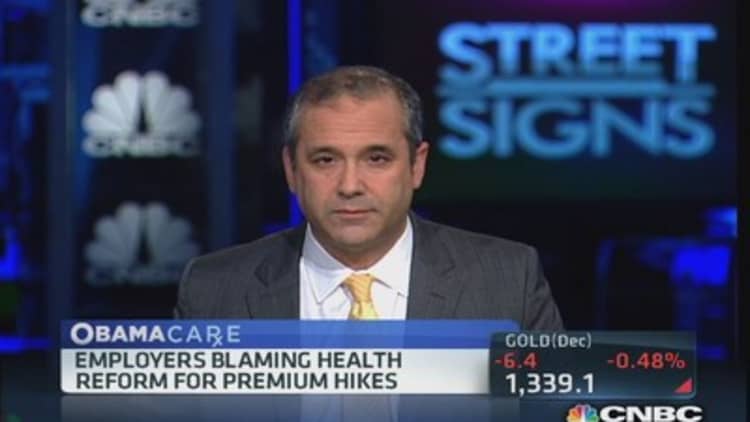
The estimated 149 million Americans under age 65 who get their health insurance through their employers could be the next group to feel the impact of the Affordable Care Act.
Open enrollment for 2014 is about to begin at thousands of companies, and many employers are blaming Obamacare—at least in part—for cost increases they are passing on to their workers.
Employees' costs are expected to rise 5 to 7 percent next year, according to early estimates. Those annual increases have been a fixture for years. But in some 2014 open enrollment documents reviewed by CNBC, companies are specifically citing the law as a factor in next year's pricing.
(Read more: Obamacare, shutdown hurt Obama's standing: NBC News/WSJ poll)
"(F)ederally mandated health care changes will require Comcast-NBCUniversal to pay new fees and implement plan design changes that will contribute to the increased cost of our plans," says the open enrollment guide for CNBC.com's parent company, where employee health care premiums are rising by double digits, and deductibles in some cases are doubling. The guide also cites rising health care delivery costs not directly related to the new law.
Other employers have adopted similar language.
The open enrollment guide for a New York area law firm informs employees that premiums for one of its plans will be rising 6.5 percent in 2014. "Please note that approximately 3 percent of the increase is attributable to health care reform fees."
But most of the language in open enrollment guides is not specific about the portion of the increases attributable to the Affordable Care Act, allowing companies and insurers to use the new law as an excuse for increases they might have implemented anyway.
Jerry Burns, a Philadelphia-based manager for an international electronics firm, said he recently learned his premiums would be rising between 8 and 9 percent next year, though his employer did not say why.
(Read more: Obamacare can't make health care cheaper: Langone)
"It was just, 'Here it is, pay it,'" he said. "I'm not happy about it, but you know it's coming every year."
Indeed, premium increases for employer-provided insurance have been happening for years.
In the past 10 years, worker contributions to their health insurance have risen 89 percent—from $2,412 to $4,565 per year, according to an annual survey by the Kaiser Family Foundation. During that same period, employers' share of the cost has also risen, though not as much. The study said employer costs rose 77 percent, from $6,657 per employee to $11,786.
The report, issued in August, predicted more changes as more far-reaching provisions of the Affordable Care Act go into effect next year.
(Read more: Obamacare minimum benefits: CNBC Explains)
Members of the CNBC Global CFO Council, representing public and private companies from various major sectors, are overwhelmingly bracing for rising costs. Of those responding to a survey this week, nearly 82 percent said they expect their company's health care costs to rise in 2014, though nearly half said the increases had little or nothing to do with the Affordable Care Act.
The open enrollment materials reviewed by CNBC also say more people are using health care. And a New Jersey publishing company cites a "significant increase in our claims experience."
But insurance providers say they are already passing on costs that are a direct result of the health care law.
"Aetna alone will pass through to its customers over $1 billion in taxes and fees associated with the Affordable Care Act that need to go into pricing," Chairman and CEO Mark Bertolini told CNBC in an interview this week.
Divided among Aetna's 22 million members, that billion dollars comes to about $45 apiece—hardly enough to account for the large increases. But other features of the Affordable Care Act could have larger price tags.
The requirement that children be allowed to remain on their parents' plans until age 26 has added millions of people to employer-provided coverage rolls with little corresponding increase in revenues. Another factor in rising premiums: the law's protections for people with pre-existing conditions, according to the CEO of Universal Health Care, which operates 23 acute care hospitals and 197 behavioral health centers across the country.
"That's not insurance, that's not spreading the risk," said CEO Alan Miller. "So you're going to have people who get a policy, once they're diagnosed with some dire condition."
(Read more: White House knew millions could not keep plans under Obamacare)
The law is designed to offset the cost of covering people with pre-existing conditions by guaranteeing millions of new customers for insurance companies. But with the ultimate number of new customers still unclear, insurers are raising prices pre-emptively, according to David Axene, a fellow with the Society of Actuaries.
"Nobody knows who's going to sign up, nobody knows who will be the expensive ones and whether they'll sign up, and whether the young invincibles won't sign up, and so there's a lot of uncertainty right now as to how much things will cost," Axene said.
(Read more: Obamacare's foundation 'not workable': Rep. Paul Ryan)
Axene said if fewer healthy people sign up for insurance this year—either because of website glitches, sticker shock, or because they choose to accept the federal penalty for going without insurance (the greater of $285 per family or 1 percent of family income for the first year)—insurers could raise employer premiums even higher, just in time for open enrollment next year.
—By CNBC's Scott Cohn. Follow him on Twitter @ScottCohnCNBC.


